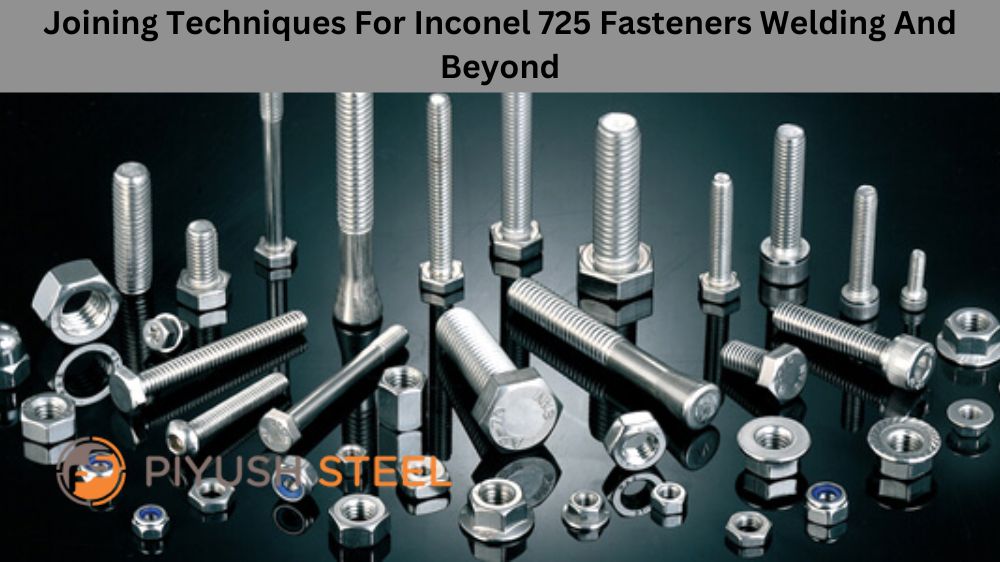Joining Techniques For Inconel 725 Fasteners Welding And Beyond
Inconel 725 is a nickel-chromium alloy widely used in extreme environments with high temperatures, pressure, and corrosive elements. Because of its characteristics, Inconel 725 is the go-to material for critical applications such as aerospace, oil and gas, nuclear power plants, and medical technologies. However, working with Inconel 725 requires thorough understanding the joining techniques. Welding is the most common, but other methods can be used to join Inconel 725 fasteners. Join us as we explore these techniques and become a master in the art of Inconel 725 fasteners joining.
What Are Inconel 725 Fasteners?
Inconel 725 is a high-strength, corrosion-resistant nickel-chromium-molybdenum alloy. It is commonly used in extreme environments such as aerospace and marine applications due to its outstanding resistance to oxidation and sulfidation at high temperatures. In addition, it has excellent mechanical properties, making it ideal for fastener applications where strength and reliability are crucial. With its superior performance in harsh conditions, it’s no wonder that Inconel 725 fasteners are highly sought after by industries requiring top-notch quality and durability. So, if you want reliable and long-lasting fasteners for your critical applications, Inconel 725 is the way to go!
Welding
Welding is the most common way to join Inconel 725 fasteners. However, welding Inconel 725 is a complex process that requires a skilled operator. Tungsten Inert Gas (TIG) welding is the preferred method for welding Inconel 725 because it allows for precise control of the heat input. In TIG welding, the welding operator uses a tungsten electrode to create an electric arc between the electrode and the workpiece. Inconel 725 filler wire is fed into the weld pool, creating a solid and corrosion-resistant joint. However, welding Inconel 725 requires a preheating and post-weld heat treatment to prevent the formation of cracks in the weld and maintain its mechanical properties.
Brazing
Brazing is a technique that uses a filler metal with a lower melting point than the base material to join two or more pieces of metal. This process is typically used in applications where welding would damage the base material’s properties or where welding is not feasible. Brazing is also less expensive than welding and can be used to join dissimilar metals. However, brazing is not recommended for Inconel 725 because it can create a brittle joint that is susceptible to cracking under mechanical stress.
Adhesive Bonding
Adhesive bonding is a unique and innovative way of joining Inconel 725 components that do not require high temperatures. Adhesive bonding is a low-cost process joining complex shapes and dissimilar materials. However, it is not recommended for high-stress applications and can be susceptible to degradation over time due to environmental factors.
Mechanical Fastening
Mechanical fastening is a joining technique that uses mechanical components such as bolts, screws, and rivets to join two or more pieces of metal. Mechanical fastening is a quick and easy way of joining Inconel 725 components and does not require specialized equipment or skilled labour. However, mechanical fastening is not recommended for high-stress applications where the mechanical load is within the joint’s strength. In addition, mechanical fastening can create stress concentrations in the base material, leading to mechanical failure.
Laser Welding
Laser welding is a precise and fast joining technique that uses a laser beam to melt and join the metal components. Laser welding is ideal for joining small and complex shapes and provides excellent welding precision. Laser welding is a low heat input process, making it suitable for applications such as medical technologies. However, laser welding is not recommended for high stress applications because it can create a brittle joint susceptible to cracking under mechanical stress.
Conclusion
In summary, Inconel 725 is valuable for critical applications because of its unique characteristics. Joining techniques for Inconel 725 fasteners are primarily based on welding, but other methods are available. Brazing, adhesive bonding, and mechanical fastening are alternative joining techniques that can be used to join Inconel 725 components. However, their effectiveness depends on the specific application requirements. Selecting the most appropriate joining technique requires proper planning and understanding of the application’s mechanical requirements. Becoming a master of Inconel 725 fasteners joining techniques is critical for anyone working with Inconel 725. Choose the right technique for the job and ensure the best performance of the end product.



